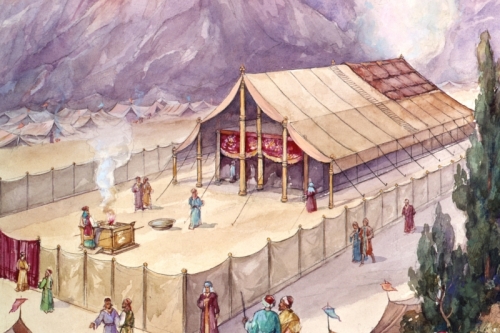- English
- 日本語
Head count, then and now
 Some activities held recently in our Church reminded me of the story of the census conducted in Israel during their journey to the promise land of Canaan after their miraculous exodus from Egypt.
Some activities held recently in our Church reminded me of the story of the census conducted in Israel during their journey to the promise land of Canaan after their miraculous exodus from Egypt.
The story, as narrated in the Book of Numbers, provides many valuable lessons in achieving goals, spiritual or otherwise.
Below is its summary:

Building the Tabernacle in the Wilderness
LESSONS FROM THE STORY
One lesson we can learn from the story is that accounting and inventory are effective planning methods. Through proper accounting of resources, one can get a grasp of his present situation. This would help him in setting goals and creating plans for the future.
The story also teaches us that faith and obedience are necessary in achieving one's goals. This is illustrated through those Israelites who along the way fell into disbelief or disobedience. Even though they were already part of Israel and included in the initial census, they were not able to reach their goal of entering Canaan.
Most bible commentators recognize that the importance of faith and of obedience is clearly taught in the story. However, most of them fail to notice or emphasize that faith and obedience are only meaningful when one belongs to the people graciously chosen by God and given the right to serve Him.
In the time of Moses, Israel was the only group of people whom God gave the right to serve Him and receive His promises. However genuinely a non-Israelite would have liked to believe that he was also promised by God, he could have never obtained God's promises without belonging to Israel.
Similarly, in our time, however one would genuinely like to believe that Christ is his personal savior, but if he is not part of the flock or the Church of Christ, it is as if he does not believe at all. The Savior Himself attested to this when he said "but you do not believe because you are not my sheep. My sheep listen to my voice; I know them, and they follow me. I give them eternal life, and they shall never perish" [2]. Clearly, one cannot be considered as believing if he is not of the sheep of Christ. One needs to be not just in any flock. He must be among the sheep or in the flock or Church of Christ to be considered as one having faith and be assured of the promised eternal life.
In other words, to see if you really have faith and thus counted among those who will receive God’s promises, you need to make sure that you belong to a flock to begin with and that that flock is really of Christ.
To see if your flock is really of Christ, you have to ask yourself, “Does my group teach the same belief held by the early Church such as the belief in 'one Lord, one faith, one baptism; one God and Father of all, who is above all'[3]? Or are my beliefs contrary to the belief of the early Church, in that I believe in three in one Lord, one faith with respect to essentials only, optional baptism, one God and Father who is not above all but has equals?"
OUR JOURNEY
Through the story of the journey of Israel, we can see the rationale behind the establishment of the Church Secretariat and the wisdom behind registry-related activities in our present time. Just like what Moses and Aaron did, our present leaders are doing all they can to prepare us for the journey ahead. If only our leaders could, they would have put everyone in a basket and hand us over to our Lord. The efforts of the present Church administration reflect the love and care of the Father Himself and of His Son for the flock. If God counts and names inanimate things such as stars[4] and knows even the count of our hair[5], how much more when it comes to His children? Will not the good shepherd leave the ninety-nine sheep and go after the lost sheep until he finds it? Indeed, it is not the will of our Father who is in heaven that one of the little ones should perish.
May we all learn from the lessons of the story of the journey of Israel and be found listed in the Book of Life on the final head count.
"And I saw the dead, small and great, standing before God, and books were opened. And another book was opened, which is the Book of Life. And the dead were judged according to their works, by the things which were written in the books. The sea gave up the dead who were in it, and Death and Hades delivered up the dead who were in them. And they were judged, each one according to his works. Then Death and Hades were cast into the lake of fire. This is the second death.[ And anyone not found written in the Book of Life was cast into the lake of fire." [6]
REFERENCES:
[1] The Book of Numbers, Timothy R. Ashley
[2] John 10:26-28
[3] Ephesians 4:5-6
[4] Psalm 147:4; Isaiah 40:26
[5] Matthew 10:30
[6] Rev. 20:12-15 * Building Tabernacle image taken from Visual Bible Alive
Add new comment